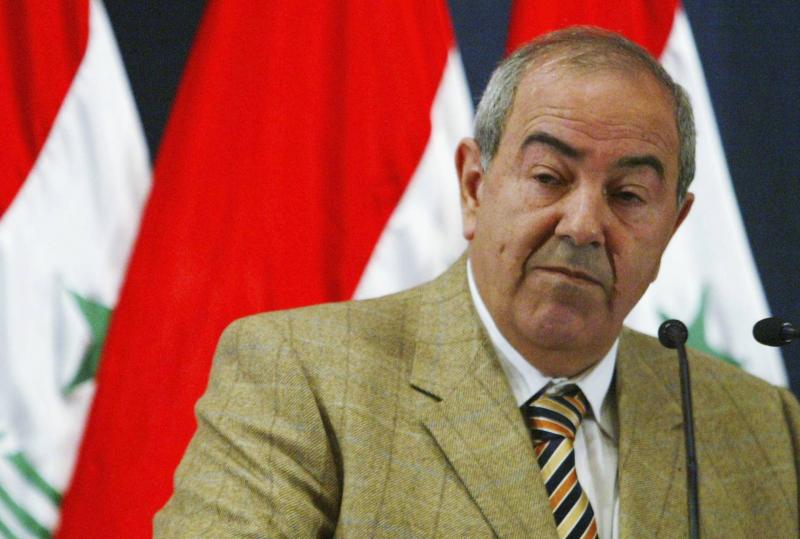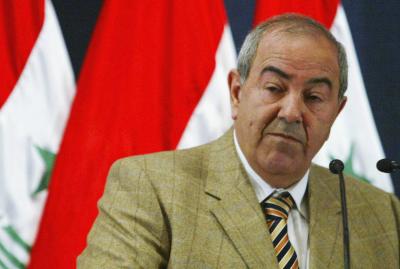Former Iraqi Prime Minister Ayad Alawi warned that Iraq is experiencing an "unannounced civil war" among its components, criticizing Washington for failing to protect the democratic experience in the country. He also highlighted the dangers of the "multiplication" of ISIS and terrorists through prisons if they are not reformed. In an interview with The National, Alawi, who is considered the first Prime Minister after 2003, described as an "Arab Shiite secular" and former Vice President, stated that "prisons have become fertile ground for extremism." He added that the conflict used to be "between Sunnis and Shiites," but has now expanded to include tribes, regions, and provinces, warning that if the problem continues in this manner, it will lead to a civil war across the country.
In the interview conducted at his home in London, after twenty years since he held office, Alawi remarked that prisons are a "breeding ground for ISIS" and that the extremist group may be on the rise. He proposed one solution being the "cleansing of prisons" of those "accused for political reasons" and that there should be an amnesty.
Alawi emphasized the need for a push towards national unity and reconciliation among various ethnic and religious components, and he expressed his disappointment with what Iraq has faced over the past two decades since the American invasion, which dismantled Saddam Hussein's regime and security forces. Since then, years of corruption and sectarianism have dominated the politics, with ethnic and sectarian parties infiltrating ministries and government positions.
The report noted the years of violence and brutal war in 2006 followed by the rise of ISIS in 2014. Alawi stated that while these periods of turmoil may seem to have ended, the same strong and destructive tensions are rising once again, behind the scenes. According to Alawi, "there is now an unannounced civil war. I was against the occupation and the war, but the Americans wanted to divide the country into Sunni and Shiite. Now we see Shiites against Sunnis, and Shiites against themselves, and Sunnis against each other," pointing out that "Sunnis still cannot elect a person to the presidency of Parliament due to their disagreements."
The report referred to the 2005 constitution, citing Alawi saying, "The mistake is that we did not apply equal citizenship to everyone, and we had a government run by sectarian quotas." Alawi, who led the country for nine turbulent months, stated that the United States and its allies did not protect democracy in Iraq, leading to an endless internal conflict that extended to the region. While the report noted that Alawi won the 2010 elections but was unable to secure a majority, he accused Iran of obstructing his attempts to become Prime Minister, as Nuri al-Maliki took his place. Alawi expressed, "Iran played a very negative role. We had support from the Americans from the beginning."
According to Alawi, "Iran played a role when America toppled Saddam; they collaborated with the Americans and began to impose their will on the course of events in Iraq, up to 2010 when they came and said: Alawi cannot form the government." The report mentioned that Alawi led a coalition government that he claims was committed to a secular future for Iraq but indicated that he believed the prevailing political conditions during the elections and the voting mechanisms were not conducive to a fair voting system. He added, "If I had known this would be the case, I would not have held the elections." He continued, stating that "there should not have been any group or list appearing as Shiite, Sunni, or Kurdish. This is something I should have done."
The report indicated that Alawi recently informed senior politicians in Baghdad from Prime Minister Muhammad Shia al-Sudani's government of his concerns, but they responded that they were unable to do anything about the situation. He stated, "I asked why? What is the problem? You must do this; you must call for early elections. We really need to correct ourselves before losing all of Iraq."
According to the report, Alawi holds the United States responsible for creating a division in the country between Sunnis, Shiites, and Kurds and for igniting sectarian tensions. He remarked, "This kind of problem occurred in Iraq at that time, and has gradually multiplied over time to create the Iraq we know today." Further, while referring to the years of violence and the brutal war in 2006 and the rise of ISIS in 2014, Alawi stated that while these periods of turmoil may seem to have ended, the same strong and destructive tensions are rising again behind the scenes.
The report reminded of the attack on the "KFC" restaurants in Baghdad, with Alawi commenting that these attacks raise questions about whether it is possible to maintain relative calm and stability in Iraq during the years following the defeat of ISIS, highlighting the impunity of militias. Alawi continued, stating that "if this continues, we will witness a direct attack on the Americans stationed in Iraq; this is a strong possibility."
Alawi warned of the potential division of Iraq if disputes among political parties persist. He emphasized, "We need the rule of law and national unity, and we need to apply the concept of citizenship. As you know, Iraqis are ready to drown in the sea rather than be citizens in a country that fails to provide adequate public services."




